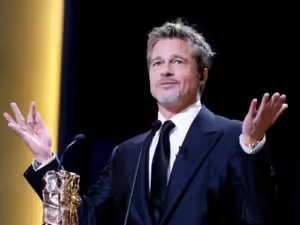
In a recent TikTok video, Chloe Fineman, a cast member of Saturday Night Live (SNL), opened up about a difficult experience she had while working with Elon Musk during his hosting stint on the show in May 2021.
She revealed that Musk’s behavior made her cry, shedding light on the pressures and emotional challenges faced by comedians in the high-stakes environment of live television.
This revelation has sparked conversations about the interactions between hosts and cast members on SNL, as well as the broader implications of celebrity culture.
Chloe Fineman’s TikTok Revelation
The Context of the Video
Chloe Fineman’s TikTok video, posted on November 11, 2024, quickly caught the attention of fans and media alike.
In the video, she responded to recent comments made by Elon Musk regarding SNL and impressions of him.
Musk had expressed his dissatisfaction with Dana Carvey’s impersonation of him on a recent episode of SNL, leading to discussions about his time on the show.
Fineman’s Emotional Experience
In her video, Fineman claimed, “I’m gonna come out and say, at long last, that I’m the cast member that he made cry and he’s the host that made someone cry.”
This statement highlights the emotional toll that hosting SNL can take on the cast, especially when dealing with high-profile guests like Musk.
She recounted how she had worked hard on a sketch for the episode, staying up all night to write it and prepare for the show.
When she approached Musk with her script, she was met with a cold and dismissive response that left her feeling hurt and disheartened.
The Interaction with Musk
Fineman described how Musk looked at her as if he were firing her from Tesla, saying, “It’s not funny.”
This blunt criticism was not what she expected after putting in so much effort.
She waited for him to lighten the mood or joke about it, but instead, he continued to critique her work harshly.
Fineman recalled Musk going through her script and saying, “I didn’t laugh once. Not one time.”
This moment was particularly painful for her, as she had invested so much time and energy into creating a sketch that she was passionate about.
The Aftermath
Despite the challenging interaction, Fineman noted that the sketch ended up being fine and that she enjoyed the experience overall.
She acknowledged Musk’s comedic talent, stating, “I thought you’re really funny in it.”
However, she emphasized the importance of manners and respect when working in a collaborative environment like SNL.
Her video serves as a reminder that even in the world of comedy, where laughter is the goal, the feelings and hard work of individuals matter significantly.
The Impact of Celebrity Culture on Comedy
The Pressure of Live Television
Working on a show like SNL comes with immense pressure.
Cast members often have to deal with high-profile guests who may not understand the collaborative nature of comedy.
When celebrities host, they bring their own expectations and attitudes, which can sometimes clash with the creative process of the cast.
Fineman’s experience illustrates how these interactions can lead to emotional challenges, even for seasoned comedians.
The Role of Feedback in Creativity
Feedback is an essential part of the creative process, but it must be delivered constructively.
Musk’s harsh criticism of Fineman’s work could have been approached with more sensitivity.
Constructive feedback fosters a supportive environment where creativity can thrive, while negative comments can stifle it.
Fineman’s experience highlights the need for hosts and guests to be mindful of their words and the impact they have on those around them.
The Importance of Respect in Collaboration
Respect is crucial in any collaborative effort, especially in the fast-paced world of live television.
Fineman’s comments about Musk’s behavior underscore the significance of treating colleagues with kindness and consideration.
When artists work together, mutual respect can lead to better performances and a more enjoyable experience for everyone involved.
The Broader Implications for SNL and Its Guests
SNL has a long history of hosting various celebrities, and interactions between cast members and hosts can vary greatly.
Fineman’s story serves as a reminder that behind the glitz and glamour of celebrity culture, there are real people with real feelings.
As fans of SNL, it’s essential to recognize the hard work and dedication that goes into each episode and the emotional toll it can take on those involved.
The Pressure of Live Television on SNL Cast Members
Introduction
Saturday Night Live (SNL) is a groundbreaking sketch comedy show that has entertained audiences for decades.
However, behind the laughter is a world filled with immense pressure, particularly for the cast members.
This blog post explores how the pressure of live television affects those who perform on SNL, delving into the emotional, creative, and performance-related challenges they face.
The Environment of Live Television
The High Stakes of SNL
Being part of SNL is a dream for many comedians and actors, but with this opportunity comes significant pressure.
The show is broadcast live, meaning there are no second chances.
Performers must deliver their lines flawlessly, execute perfect timing, and connect with the audience in real-time.
Mistakes can be embarrassing, and the fear of failure looms large.
Audience Expectations
SNL has built a reputation for quality comedy, leading to high expectations from viewers.
Fans look forward to clever sketches, timely satire, and memorable performances.
When audience expectations are exceedingly high, the pressure on cast members intensifies.
They often feel they must outdo previous performances or showcase their best work every time they hit the stage.
Emotional Challenges for Cast Members
Anxiety and Self-Doubt
The pressure of live television can lead to increased anxiety and self-doubt among performers.
Before going on stage, cast members might experience a whirlwind of emotions, from excitement to fear.
Doubts about their abilities can creep in, making it difficult to maintain focus.
These feelings are common, especially when they know millions of viewers are watching.
The Impact of Criticism
Criticism is an unavoidable part of being in the limelight.
When sketches do not resonate with the audience or receive negative reviews, cast members can be adversely affected.
Social media often amplifies this criticism, as viewers freely share their opinions.
The potential for public backlash adds an extra layer of stress, making performers second-guess their creative choices.
The Creative Pressure of Television
Time Constraints
One of the unique aspects of SNL is the incredibly tight schedule the cast works under.
With only a few days each week to write, rehearse, and perform, the timeline is relentless.
Cast members often scramble to come up with fresh ideas and execute them quickly.
This expedited process can lead to creative blocks and fatigue, challenging their ability to deliver high-quality comedy.
Navigating Collective Creativity
SNL relies on collaboration among cast members, writers, and directors.
While working as a team can spark creativity, it can also create tension.
Strong personalities and differing ideas can lead to conflicts that exacerbate the pressure of producing a successful show.
Balancing individual creativity with group dynamics can be challenging, especially when deadlines loom.
Performance Issues in a Live Setting
The Thrill and Fear of Live Performance
Performing live is both thrilling and terrifying.
For many cast members, the adrenaline rush of being on stage can be exhilarating.
However, that thrill comes with the fear of mistakes, which can be magnified in a live environment.
Performers must learn to channel their nerves into energy to engage the audience effectively.
The Unpredictability of Live Audiences
Every performance on SNL features a live audience, adding another layer of complexity.
Audience reactions are unpredictable; sometimes sketches land wonderfully, and other times, they fall flat.
Cast members must respond to audience feedback in real-time, adjusting their performances based on the crowd’s energy.
Understanding audience dynamics is a skill that requires experience and adaptability.
Coping Mechanisms for SNL Cast Members
Building Resilience
To cope with the immense pressure, SNL cast members often build resilience.
They learn to bounce back from failures and focus on the next opportunity.
This resilience allows them to continue honing their craft, despite setbacks.
Support from Peers
Having a supportive cast and crew can alleviate some of the pressure.
Many cast members form close bonds, offering each other encouragement and advice.
This camaraderie can provide a safety net when pressures mount, helping individuals to cope with stress more effectively.
Professional Development
Many SNL performers invest time in developing their skills beyond the show.
This may include attending workshops, participating in improv classes, or working with coaches.
These experiences contribute to their confidence and ability to handle the pressures of live performance.
The Role of Producer and Writers
Guidance and Structure
Producers and writers play a crucial role in helping cast members navigate the pressure of live television.
They provide guidance, structure, and feedback that can ease the stress of creating content.
By working collaboratively, the team can produce a cohesive show that meets audience expectations while supporting the performance aspect.
Feedback and Development
Constructive feedback from producers and writers helps cast members grow in their roles.
Regular discussions about sketches and performances can clarify expectations and lead to improvement.
This collaborative communication can help create an environment where creativity thrives, even under pressure.
Improving Interactions Between Hosts and Cast Members on SNL
Saturday Night Live (SNL) is well-known for its dynamic blend of comedy and celebrity appearances.
While the show thrives on the energy of its hosts and cast members, interactions between them can sometimes be challenging.
This blog post examines ways to improve these interactions for a more harmonious and productive environment on set.
By focusing on communication, mutual respect, and collaboration, SNL can enhance both the creative process and overall performance quality.
Enhancing Communication
Clear Expectations from the Start
One crucial aspect of positive interactions is establishing clear expectations.
Before a host joins the SNL team for the week, a detailed brief should outline the schedule, sketch concepts, and roles.
This groundwork allows everyone involved to understand their responsibilities, reducing confusion and potential conflicts.
Creating a shared vision can lead to more cohesive sketches and collaborations.
Regular Check-Ins
Holding regular check-ins throughout the week can foster open communication.
These meetings provide opportunities for cast members and hosts to discuss ideas, address concerns, and offer feedback on sketches.
Encouraging dialogue helps everyone feel involved in the creative process and promotes transparency.
This approach can prevent misunderstandings and build stronger relationships.
Fostering Mutual Respect
Acknowledging Contributions
Mutual respect is vital for productive interactions.
Hosts should recognize and appreciate the hard work that cast members put into their performances.
A simple acknowledgment of effort can go a long way in building rapport.
When hosts show appreciation, cast members feel valued, leading to a more positive atmosphere.
Creating a Supportive Environment
Encouraging a supportive environment is essential in reducing pressure on both hosts and cast members.
Hosts should be reminded that they are part of a collaborative effort, fostering an atmosphere of camaraderie.
This support can help alleviate the fear of failure, allowing everyone to take creative risks in their performances.
Creating this sense of unity can enhance the overall quality of the show.
Building Collaborative Relationships
Team-Based Approaches
Adopting a team-based approach to sketch creation can significantly improve interactions.
Instead of working in isolation, hosts and cast members should collaborate from the early brainstorming stages.
This inclusive process nurtures creativity and allows everyone to contribute ideas.
Seeing each other as partners in the creative process fosters deeper connections.
Workshops and Rehearsals
Conducting workshops and rehearsals where hosts and cast members practice together can break down barriers.
During these sessions, they can experiment with different ideas and develop comic chemistry.
This shared experience builds familiarity and trust, allowing performers to gauge each other’s timing and style.
By investing time in rehearsals, everyone becomes more comfortable with one another, leading to smoother performances.
Providing Constructive Feedback
Setting a Positive Tone
Establishing a culture of constructive feedback is crucial in improving interactions.
Hosts and cast members should be encouraged to provide feedback in a positive manner.
Instead of focusing on what went wrong, they can discuss what worked well and offer suggestions for improvement.
This approach minimizes defensiveness and promotes a healthier exchange of ideas.
Using Humor to Diffuse Tension
Humor can be an effective tool for diffusing tension during feedback sessions.
A light-hearted approach can make it easier for hosts and cast members to communicate openly.
Using jokes or funny anecdotes can help foster camaraderie while providing helpful insights.
This atmosphere of fun can make constructive criticism feel less intimidating.
Emphasizing Emotional Intelligence
Training in Emotional Awareness
Developing emotional intelligence among hosts and cast members can greatly impact interactions.
Training sessions highlighting emotional awareness can teach individuals to better understand their feelings and those of others.
Recognizing emotions in oneself and in team members can prevent misunderstandings and promote empathy.
Empathy enhances communication and leads to stronger working relationships.
Encouraging Vulnerability
Encouraging both hosts and cast members to be vulnerable can further enhance connections.
When individuals feel comfortable sharing their insecurities or concerns, it promotes openness and trust.
Being vulnerable cultivates an environment where everyone feels safe to express their ideas.
This supportive atmosphere can lead to more innovative and cohesive performances.
Creating Opportunities for Bonding
Social Activities Outside of Work
Hosting social activities outside of the workplace can improve relationships.
Shared experiences like team dinners or game nights allow hosts and cast members to bond.
These relaxed settings create strong connections that carry over into performances.
When individuals know each other personally, it leads to better teamwork on stage.
Celebrating Milestones Together
Recognizing and celebrating milestones, such as birthdays or work anniversaries, fosters a sense of community.
Taking time to acknowledge achievements enhances the connection between hosts and cast members.
Celebrations create memories and joy, reinforcing the importance of teamwork.
This camaraderie strengthens relationships and contributes to a more positive work environment.



















